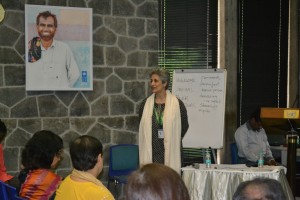First ever voluntary training on sexual harassment held for United Nations staff in India
Date:
In a first ever voluntary training session on sexual harassment, United Nations staff were explained how to identify sexual harassment and the options available for redressing it.
New Delhi - A first ever voluntary training on sexual harassment was held for almost 80 United Nations staff from 11 United Nations agencies in India. Organized by UN Women and the UN Department of Safety and Security (UNDSS), the workshop informed staff about redressal mechanisms to address sexual harrassment within the UN system. Held as part of the UN Secretary General’s UNiTE to End Violence against Women campaign and ‘Orange Day’, the workshop sent out a strong message for zero tolerance of sexual harassment.
UN’s Sexual Harassment Policy

Ms. Mona Choudhuri from UNDSS led a highly interactive session that helped participants articulate what conduct constitutes sexual harassment. “Sexual harassment is any unwelcome sexual advance, request for sexual favour, verbal or physical conduct or gesture of a sexual nature, or any other behaviour of a sexual nature that might reasonably be expected or be perceived to cause offence or humiliation to another,” said Mona. She also explained practical steps to take in the event one faces sexual harassment. “Any staff member of dependent who has been sexually harrassed or assaulted can call the Safety and Security, and anything reported will be kept strictly confidential,” she added.
The UN conducts mandatory training for its staff members. For example, UNDSS carried out a Women’s Safety and Awareness Training on 5 July, 2013 which was attended by 50 participants. Voluntary trainings, like the current one, and online trainings inform UN staff about identifying sexual harassment and ways of seeking redressal. Online trainings have an added advantage of having a wide outreach and continuously evolving to address a prevailing situation. According to the UNDP Multi-Country Office Global Staff Survey, 58 percent of UNDP staff in those offices became aware of the office’s code of conduct through online trainings. Christine Bendel at UNDP Head Quarters says that a new mandatory online training, that will be available in December 2013, is being revised to shift its focus from the intention of the alleged perpetrator to the feelings of the victim.
Ms. Norah Nyeko from UN Women gave an analysis of the 2012 UNDP Country Office Global Staff Survey, preventative measures and reactive mechanisms used by the UN to address sexual harassment internally. “According to the survey, UNDP staff have a strong knowledge of the rules and regulations on sexual harassment. They also have a strong conviction to report a case of witnessing harassment,” she said.
The training was well attended with participants from UNDP, UNV, WFP, FAO, UNFPA, World Bank, UNAIDS, UNESCO, IFC, UNDSS, UNODC and UN Women.
Sexual harrassment legislation in India
Ms. Naina Kapur, discussed legislative and organisational developments on sexual harassment. She recounted the development of the ‘Vishaka Guidelines’ which formed a foundation for anti-sexual harassment legislation in India today. “One should be able to identify what accounts for sexual harassment. It is important to be clear about who the ombudsman in the organization is,” said Ms Kapur as she took the audiences through situations that accounted for sexual harassment and ways of formal and informal redressal within organizations.
Ms. Lise Grande, Resident Coordinator of the United Nations in India, expressed concern that politicians had not given enough attention to the issue of sexual harassment. She, however, noted that “Important developments like the enactment of the Criminal Law Amendment Act and the Sexual Harassment Act in 2013 demonstrates the Government of India’s concern for social issues that women face.”
India has been at the centre of global attention with regard to violence against women since December 2012, after a student, who was gang-raped, succumbed to her injuries. India has since amended the Code of Criminal Procedure (1973), that is, the Criminal Law (Amendment) Act of 2013 and asserted that any person making unwanted physical contact and explicit overtures, demanding or requesting sexual favours, making sexually coloured remarks or forcibly showing pornography may be imprisoned up to five years.
The training was a prelude to the awareness raising activities jointly being organized by all UN agencies in India from 25 November to 10 December 2013.